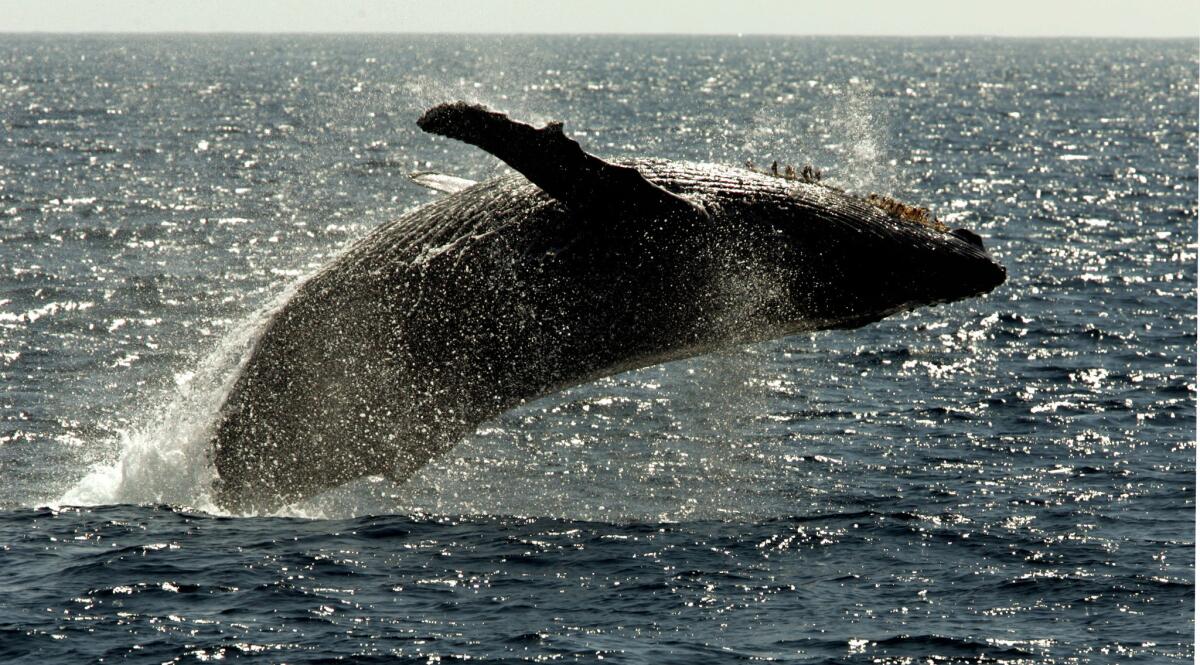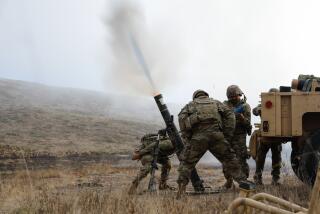Navy agrees to restrict offshore training to protect marine mammals

A humpback whale leaps out of the water off Maui. To settle a lawsuit brought by environmental groups, the Navy agreed Monday to rule certain areas off-limits to training near Southern California and the Hawaiian islands.
To settle litigation brought by environmental groups, the Navy has agreed to curtail use of sonar and underwater explosives during training in key areas for marine mammals off Southern California and Hawaii.
The settlement between the Navy, the National Marine Fisheries Service, the Natural Resources Defense Council and Earthjustice was signed Monday by U.S. District Judge Susan Oki Mollway in Honolulu.
In April, Mollway had sided with the environmentalists in their assertion that the National Marine Fisheries Service violated federal environmental laws when it decided that the Navy’s training would have a “negligible impact” on whales, dolphins, seals, sea lions, and sea turtles.
The judge’s ruling and stern admonishment of the federal agency set off months of negotiations between the Navy, the National Marine Fisheries Service and the two environmental groups representing the interests of several other groups.
Earthjustice attorney David Henkin, who brought an initial challenge to the Navy’s training plans on behalf of the Conservation Council for Hawai’i, the Animal Welfare Institute, the Center for Biological Diversity and the Ocean Mammal Institute, hailed the settlement.
The Navy’s testing plan could have proven disruptive to feeding areas and migratory corridors and undersea places where “resident” populations reside, he said.
“By agreeing to this settlement, the Navy acknowledges that it doesn’t need to train in every square inch of the ocean and that it can take reasonable steps to reduce the deadly toll of its activities,” Henkin said.
A Navy spokesman said the Navy agreed to the settlement because it faced “the real possibility that the court would stop critically important training and testing.”
The Navy already has “existing restrictions” on its use of sonar and underwater explosives, said Lt. Cmdr. Matt Knight, spokesman for the U.S. Pacific Fleet.
“The Navy has been, and will continue to be, good environmental stewards as we prepare for and conduct missions in support of our national security,” Knight said. The new restrictions will remain in effect under the Marine Mammal Protection Act.
The litigation centered on a disagreement about how many marine mammals might be damaged by the Navy’s training regimen.
Mollway ruled that the Navy had vastly underestimated the threat to marine mammals, including during its major multinational exercise held off Hawaii every two years, called Rim of the Pacific.
According to the environmental groups, the settlement calls for a ban on mid-frequency sonar and explosives on the eastern side of the Big Island and north of Molokai and Maui, in an effort to protect whales and Hawaiian monk seals. Surface ships would be required to use “extreme caution” to avoid hitting humpback whales.
Off the coast of Southern California, the Navy is banned from using mid-frequency sonar between Santa Catalina Island and San Nicolas Island, also near blue-whale habitat off San Diego, the environmental groups said. The same “extreme caution” would be required for ships in the feeding habitat and migratory corridors for blue, fin and gray whales.
The Navy asserted its training could kill 155 whales over five years. The environmentalists said the number of those killed or crippled would be much higher.
Among other training exercises, the Navy uses sonar to teach sailors how to detect “super quiet” submarines that can operate in relatively shallow near-shore areas. Among the nations favoring such subs are Iran and North Korea.
“It is essential that sailors have realistic training that fully prepares them to prevail when and where necessary,” Knight said.
Although the Navy would have preferred a less-restrictive agreement “this settlement agreement preserves critically important testing and training,” Knight said.
Bill Rossiter, executive director for advocacy, science and grants at the Cetacean Society International, said the agreement means “beaked whale populations in Southern California that have been suffering from the Navy’s use of sonar will be able to find areas of refuge where sonar will be off limits.”
Twitter: @LATsandiego
More to Read
Sign up for Essential California
The most important California stories and recommendations in your inbox every morning.
You may occasionally receive promotional content from the Los Angeles Times.










